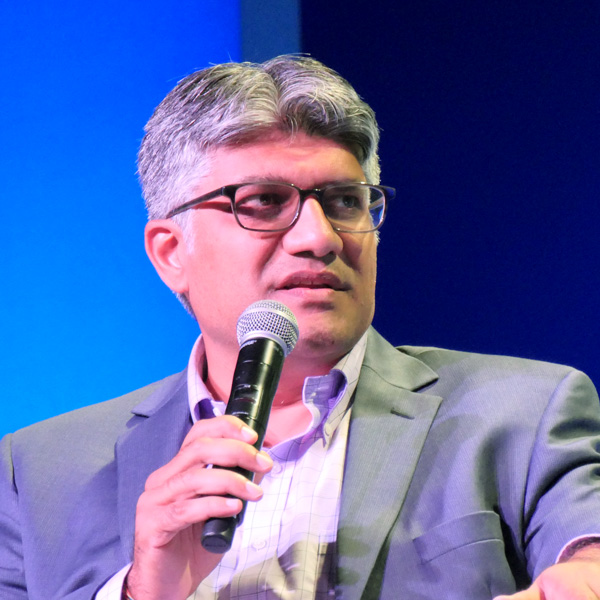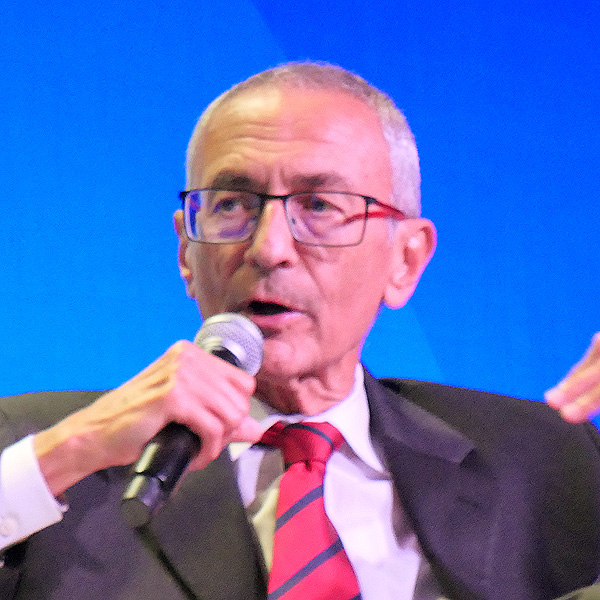
PITTSBURGH — Sen. Joe Manchin’s appearance at the Global Clean Energy Action Forum on Friday was disrupted by a small group of protesters dressed in bright red T-shirts and grotesque Halloween masks, who stood up and started yelling shortly after he walked on stage.
As the loud and wildly gesturing group protested the Mountain Valley Pipeline and Manchin’s ties to the fossil fuel industry, the West Virginia Democrat thanked them, with an undertone of sarcasm, for being “so kind and so civil.” But once they were herded out of the hall at the David L. Lawrence Convention Center, he used his “fireside chat” with Carnegie Mellon University President Farnam Jahanian to promote his views on the U.S. clean energy transition, the implementation of the Inflation Reduction Act and his proposed permitting bill now before Congress.
The Obama administration’s support of the solar and wind industries resulted in “a lot of people [being] left behind when, basically, energy [policy] and regulations put a lot of [the] fossil industry out of business,” Manchin said. “That really divided us in this country, and I think you see the results now in the political discourse we have.”
The energy “transition is going to happen. We need it to happen, but it has to happen in an orderly way,” he said. “You cannot get rid of the horsepower that runs our country. You cannot remain a superpower of the world if you don’t have energy independence and energy security.”
Fossil fuel workers must also know that new jobs will take the place of jobs that will be eliminated, Manchin said, pointing to the IRA’s requirement that 40% of its $10 billion in tax credits for new clean energy manufacturing goes to “energy communities” where coal mining or coal-fired generation has closed since 1999.
“A good-paying job, with great working conditions, benefits, solves all problems,” he said.
But a permitting overhaul is crucial to ensuring that the tax credits and incentives in the IRA can “come to fruition,” Manchin said. All those investments are based on “a 10-year window,” he said. “If it takes seven to eight years or longer to permit something, we’re going to miss the window … and you’re going to have money stranded out there.”
“That’s just unacceptable,” he said. “We know what needs to be done. Why can’t we do it?”
The nearly complete Mountain Valley natural gas pipeline ― covering 303 miles from northwest West Virginia to southern Virginia ― has become a critical bargaining chip and flashpoint in the permitting bill Manchin hopes to push through Congress this week as part of a continuing resolution to keep the government funded beyond Sept. 30.
Unveiled Wednesday, the Energy Independence and Security Act of 2022 would speed and simplify siting of regional and interregional transmission lines viewed as indispensable to the Biden administration’s electrification and decarbonization goals. For example, it would limit federal environmental reviews to two years, and require all other federal permits be issued within six months of a completed environmental review. (See Manchin Details Proposal to Streamline Approval of Energy Projects.)
But it would also mandate federal authorization for the completion of Mountain Valley. Due to opposition from environmental and community groups, the project has been built in segments and repeatedly delayed. According to the project website, it is now nearly 94% complete.
With opposition from Republicans and Democrats, Manchin acknowledged that getting the permitting bill through Congress “is going to take an awful lot of heavy lifting right here in the next two or three days.
“But everyone wins from this,” he said. “It’s not about one person, it should not be about one person. It should be about, ‘Is this good for our country? Does it basically show us as a leader of the world that we can basically invest in technologies and mature them quicker?’”
Shah and Straubel
While not an official UN event, the three-day GCEAF was widely seen as a launching pad for new national and international commitments and actions that will be brought forward at the 27th UN Climate Conference of the Parties (COP 27) set for Sharm El Sheikh, Egypt, in November.
Governments’ role in accelerating the commercialization and scaling of new clean technologies was a major theme at event, which was hosted by the Department of Energy.
 Jigar Shah, DOE Loan Program Office | © RTO Insider LLC
Jigar Shah, DOE Loan Program Office | © RTO Insider LLCWith billions in funding from the IRA and the Infrastructure Investment and Jobs Act, DOE has become a major player in promoting public-private partnerships ― a topic explored in a second fireside chat on Friday, between Jigar Shah, director of DOE’s Loan Program Office (LPO), and JB Straubel, CEO of lithium battery recycler Redwood Materials.
“This partnership between high-growth companies, startup companies, and the government can work best when the government is leaning forward a little bit further, taking a little bit more of a risk-reward viewpoint similar to an investor in some ways,” said Straubel, who also co-founded Tesla and served as its chief technology officer. Such public-private partnerships can “help catalyze a lot more private investment in those companies and … perhaps a bit of disruption in the bigger industries in which the startups or growth companies operate.”
But companies that accept federal funds — like Tesla, which received and paid back a $465 million low-interest loan from the LPO — may also face a stigma, Shah said, even though the company “had to raise a lot of private money before it got to profitability.”
Straubel agreed, noting that Redwood has been “careful as we find other ways to partner with different entities in the government, that we also kind of tiptoe through that [stigma] and don’t have an industry that becomes too dependent on incentives, real or perceived.
“I think that’s something that a lot of high-growth companies and startups have to be mindful of because if it goes too far, it can actually shun private capital. I think the goal here is to incentivize private capital. People don’t want to invest in an industry that is not really stable on its own merits. The government should really be there to catalyze, to kind of instigate a change but not be there to prop up something in an ongoing fashion.”
Hitting the right balance means executives at clean tech startups need to talk more with agencies like the LPO, Shah said. “This money is going to go a direction that you don’t want it to go unless you engage directly and give the government feedback,” he said. “They’re not going to get it right unless you tell them what you need to be able to catalyze your business.”
A key challenge for companies like Redwood, now in the process of building a domestic clean energy supply chain, is developing a new industry from the ground up, Straubel said.
“You have to train the workforce; you have to train the construction workers. We have to import the equipment often,” he said “It’s a pretty heavy lift to do this the first time around. But the benefit is substantial, in terms of cost, in terms of emissions [reductions],” he said.
Podesta
With the passage of the IRA — which was hailed by international leaders at the GCEAF — President Biden was able to lure John Podesta back to the White House as senior adviser for green innovation and to implement the new law and its $369 billion in clean energy funding. A veteran of both the Clinton and Obama administrations, Podesta said he “couldn’t resist” the opportunity to help roll out the IRA.
 John Podesta, senior adviser to the president | © RTO Insider LLC
John Podesta, senior adviser to the president | © RTO Insider LLC“It’s a huge deal,” Podesta said in GCEAF’s final fireside chat, with Vanessa Chan, director of DOE’s Office of Technology Transitions. The law “gives the president the tools to really help shape an economy that, at the end of the day, is going to be built by the private sector,” he said. “The bulk of the bill is aimed at providing tax-level support for those new clean technologies.”
Echoing Manchin, Podesta stressed the importance of the law’s provisions for ensuring clean energy benefits and jobs get to low-income, disadvantaged and fossil fuel communities. A key challenge there, he said, is that “the communities that have the fewest resources to access federal programs are the ones that are being undermined by legacy pollution.”
Similarly, formula funding programs — where a certain amount of federal funding is allocated to a state — “never get down to the people who need the help the most,” he said. IRA funding for technical support should improve access for these communities, he said.
Podesta also sees the IRA having global impacts, especially in making clean energy technologies available and affordable for emerging economies in Asia and Africa, another major theme at the conference.
“If we develop a green hydrogen economy in the United States, that’s not going to just stay in the United States,” he said. “The United States government also has, I think, an obligation to help support the development of clean energy around the world. … We have to be attentive to smart policies to let developing countries access those technologies and use those technologies.”



